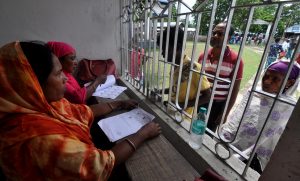There is no end to controversies over the register of citizens in India’s northeastern state of Assam, which was updated in a unique exercise as a deterrent against the influx of foreign nationals into the disturbed state.
An affidavit submitted by the National Register of Citizens coordinator Hitesh Dev Sarma to Gauhati High Court said that as many as 277,000 “undeserving” people might have enrolled their names in the National Register of Citizens (NRC) published on August 31, 2019.
The affidavit based its assessment on the results of a sample re-verification of 27 percent of the entries carried out ahead of the final publication of the list which led to the deletion of 102,462 names from the register. It contended that more undeserving names could be found in the remaining 73 percent unverified results covering an overwhelming majority of the districts in the state.
There had been persistent demands from the government and civil society groups for re-verification of the list when the project was being implemented. Just a week ahead of the register’s publication, the Supreme Court had turned down these demands on the rationale that 27 percent re-verification had already been carried out by the NRC Secretariat.
The NRC had deleted the names of 1,906,657 applicants out of a total of 33,027,661 applicants. The government has not yet issued a notification accepting the final list. The ruling Bharatiya Janata Party has already announced its intention of beginning another exercise for a new NRC.
The latest affidavit was submitted following a directive from Gauhati High Court three months ago asking the NRC state coordinator to submit a report spanning the entire state of Assam on how ineligible persons were enrolled in the register. The court issued the order after hearing a petition by a resident of Nalbari, Rahima Begam, who challenged a judgment by a foreigner’s tribunal that had declared her a foreigner.
In the affidavit, Sarma also highlighted that the names of 4,795 persons were struck off the list when officials verified the details of 10,199 entries months ahead of the register’s final publication. These persons included all the categories such as doubtful or D-voters and declared foreigners, which were to be excluded from the updated NRC. The verification also unearthed the deleted names of 5,404 persons that should have been included in the NRC.
The most stinging observation in the affidavit that triggered a huge media coverage was on the software used in the exercise, which it said was created to help data entry operators include names of a “large number” of ineligible persons in the list.
Sarma pointed out that the error would be detected only through a re-examination of the process, but the software was prepared to avoid quality check enabling the verifying officers to upload wrong results to fulfill their vested interests.
To evaluate the effect of the absence of quality checks, a sample check was conducted at three centers where the names were being enrolled. It was found that the names of 943 people were enrolled through faulty uploading of data out of a total of 2,346 entries that were checked. Sarma submitted that the same verification yielded an error margin of 40.2 percent, which could not have been an unintentional human error.
Rajeev Bhattacharyya is a senior journalist in Assam, India

































